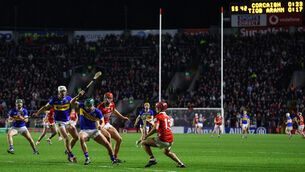Getting Munster out of the red

Recently rebranded in a nod to the commercial realities of professional sport, it may now come down to the province’s loyal following in Cork and beyond to inspire the win over Edinburgh on Friday that should secure (though not guarantee) Munster’s tenure in the top echelon of European rugby next season.
Munster’s heroics against the tourists of New Zealand, Australia, and South Africa had reached legendary status even before Tom Kiernan’s men finally registered a first ever win over an overseas tourist when Australia were dispatched 11-8 in Musgrave Park in 1967. Legend has it that with Munster clinging on to that slender three-point lead, Kiernan, Munster’s captain that day, asked referee Roy Gilliland how much time was left. The official replied ‘It’s over’.












